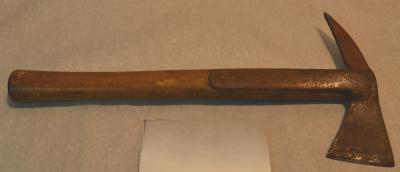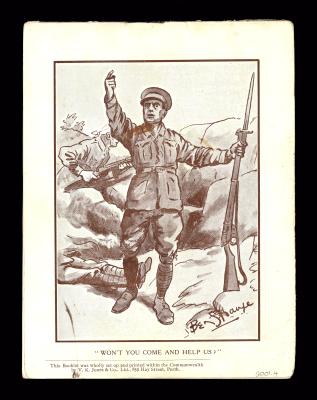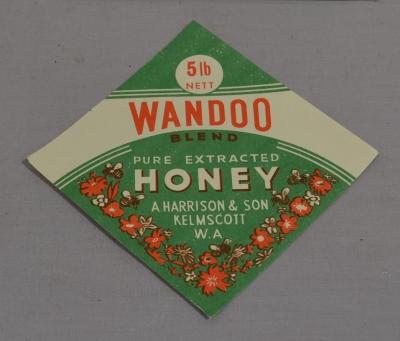CARTOON - ON A GOOD WICKET
1918Scene of a horse wearing a smoking robe sitting in a lounge chair, smoking a cigarette. To the left is a side table with a soda water bottle and two glasses, and a book with [SPORTING / GUIDE] written on the spine. To the right is a small boy with a wide lace collar with [AUSTRALIA] written on it. He is holding a tray with a bottle of champagne on it. Door in background and picture of horse on wall.
Ben Strange signature bottom right corner.
The cartoon was published in the Western Mail on 28 June 1918 with the caption:
ON A GOOD WICKET]
The cartoon shows a horse dressed as a gentleman of leisure, complete with smoking jacket, relaxing in a comfy armchair whilst smoking and enjoying being served champagne by a young boy, who has the word ‘Australia’ etched on his collar. The young boy is struggling with a large bottle of champagne on a tray as well as a glass and what could be serviettes or betting tickets. People at the time would have recognised this young boy, the ‘Little Boy From Manly,’ as representative of Australian patriotism. It was an iconic image that was a feature of Australian cartoons from the late 19th century onwards.
The cartoon suggests that the horse-racing industry is benefiting greatly from the fascination Australians have for the sport; Australia is literally in thrall to horse-racing.
The cartoon is commenting on the dominant position occupied by the horse-racing industry in Australia. Given that in 1918 Australia was still immersed in WW1, governments were worried that the population was becoming distracted by sport in general, and horse-racing in particular, with particular concern about working-class gambling.
It was noted in the Western Mail on the 29 December 1916 that
Christmas week in Perth witnesses a veritable orgy of horse racing. It is the final feast of a community (taking the State as a whole) which averages something more than a meeting of one sort and another for every week-day in twelve months.
Two select committee hearings into WA horse racing were held in 1905 and 1915, and both noted the excessive number of horse races in the state, and problems posed by the establishment of pony racing courses at the beginning of the 20th century. The demise of horse-racing as a sport, in favour of it primarily as a forum for betting, was of particular concern. The racing of horses on the pony courses that were too young over short courses also suggested the focus of the industry was not on ‘improving the breed’ but on making money. The Committee reports were particularly scathing of off-course betting as this would attract working-class punters, who were potentially less able to afford to bet.
Other states in Australia undertook similar investigations into horse-racing. In Queensland, parliamentary debate took place in July 1915 regarding the excessive nature of horse-racing in the state.
In 1917 fears about the excessive number of horse races and the popularity of pony racing amongst the working classes resulted in the Western Australian Parliament passing the Racing Restriction Act. This restricted the number of days on which horse racing could take place and also led to the abolition of pony racing. The Act, however, also increased the influence of the WATC (Western Australian Turf Club) and the WATA (Western Australian Trotting Association). They now had control of licensing in their codes.
The cartoon, therefore, picks up on the concern of Governments throughout Australia regarding the dominance of the horse-racing industry. It emphasises where power and influence is located.
Details
Details
Artist's signature bottom right [Ben Strange]
HIGH
The Ben Strange cartoons are historically significant as they depict many key figures linked to the history and development of both Western Australia and Australia. Political figures who regularly appeared in his cartoon’s included John ‘Happy Jack’ Scaddan, the Premier of Western Australia from 1911 until 1916, and William ‘Billy’ Hughes, the Prime Minister of Australia from 1915 to 1923.
City of Armadale - History House
City of Armadale - History House
Other items by Ben Strange
- CARTOON - HIS TROUBLE
- CARTOON - THE GREAT PEACE POSTER
- CARTOON - THE STRANGE ADVENTURE OF LITTLE NOT WANTED
- CARTOON - LABOUR PARTY I MUST DISOWN ALL KNOWLEDGE OF THE OBSTRUCTIVE ASS
- CARTOON - ADRIFT - DROPPING THE PILOT
- CARTOON - YOUR EYES HAVE TOLD ME SO
- CARTOON - FINANCIAL RETURN
- CARTOON - THE WAITS CHRISTMAS 1916
- CARTOON - CROWD AROUND CAR
- CARTOON - THE DECIDING FACTOR
- CARTOON - THREE GOLFERS ON A GOLF COURSE
- CARTOON - SILENCE IS NOT ALWAYS GOLDEN - AND THE LAW MAKES A POOR CUPID
Other items from City of Armadale - History House
- CARTOON - KING COAL'S GROWL
- CARTOON - TRANSFUSION OF BLOOD
- CARTOON - THE PREMIERS CONFERENCE BOVRILISED: BUT THE STATES LIVES IN HOPE
- CARTOON - SHE'S COMING! - THE NEW TERROR
- CARTOON - THE ROAD TO ARMADALE
- AXE, FIREMAN'S
- SOUVENIR BOOKLET BLACKBOY CAMP
- PACKET HONEY LABELS
- COWLS OR COLLARS LOYAL ORANGE LODGE
- COWLS OR COLLARS LOYAL ORANGE LODGE
- SILVER MILK JUG
- BLUE GLASS BOTTLE



